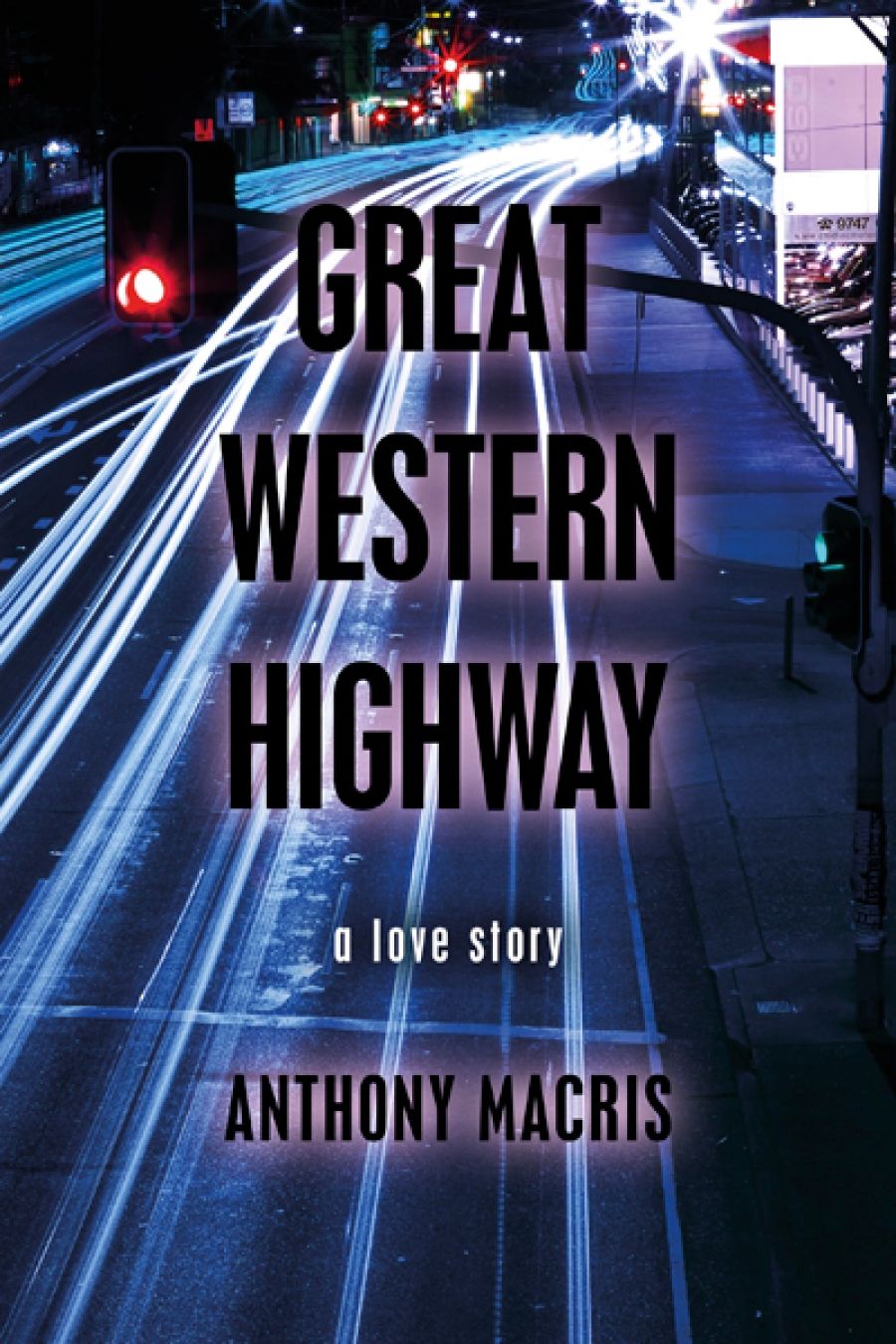
- Free Article: No
- Contents Category: Fiction
- Review Article: Yes
- Online Only: No
- Custom Highlight Text:
As I read the early pages of Anthony Macris’s Great Western Highway, I began to wonder if the whole novel might consist of a single central character walking along a city road (for the record, it doesn’t). I couldn’t decide whether I found such a prospect exciting or deflating. As I continued reading, and as Great Western Highway took flight from Parramatta Road, Sydney, to explore such weighty matters as capitalism, the First Gulf War, and Margaret Thatcher’s legacy, again and again the story captured but then lost my interest.
- Book 1 Title: Great Western Highway: A Love Story (Capital, Volume One, Part Two)
- Book 1 Biblio: UWA Publishing, $29.95 pb, 362 pp, 9781742584157
Great Western Highway comes about fifteen years after Macris’s first novel Capital (Volume One, 1997), which led to his being named as one of the Sydney Morning Herald Best Young Australian Novelists of 1998. More recently, Macris’s non-fiction book, When Horse Became Saw (2011), offered a moving account of his son’s autism.
Great Western Highway possesses an exasperated tone, suggesting that Macris is a novelist who cares and thinks deeply about the world, even as he flings aside its multiple layers to criticise what he finds underneath. On one level, he offers readers a familiar romance: can Nick and Penny get back together or will Nick’s lingering love for his ex-girlfriend Christina ruin everything? But this love story has overt political overtones. Nick and Penny fumble around in a darkness cast by capitalism’s storm clouds. Forces beyond their control, or so it seems, delimit the very way they manage to love each other.
At its best, Macris’s prose offers a conjoined portrait of people, places, and politics that provides a genuinely forceful jolt to jaded or complacent views about the wonders of the West. For example, in an extended flashback Nick sits in his London flat and consoles himself over the loss of Christina by watching hour after hour of that great television event, the Gulf War. Or take Penny’s dire and dreary afternoon of work at JobClub, a community employment assistance organisation, complete with various lost-cause clients, a ludicrous role play, and a screaming argument. When Penny realises that ‘much of being professional … was following procedure whether it meant anything or not’, she is referring to office tasks, but might easily be reflecting on life.
While Macris tackles big themes such as war and the globalised economy, it is his attention to details that is especially riveting. As Nick walks towards Penny’s house, there’s nothing simple even about the way his feet touch the footpath:
they pounded the tiny lumps strewn all over the square blocks of concrete, gobs of gum that had started out as foil-wrapped sticks of spearmint, as hot-pink blocks of Hubba Bubba, bought by schoolgirls at newsagencies and corner stores, chewed on as they gossiped, then, when no one was looking, spat out onto the street and left to be ground into the concrete, the beams of low-set headlights glancing off the flattened lumps that, no matter how much dirt they absorbed, never seemed to entirely lose their lustre.
At times, though, Macris’s hyper-detailed narrative causes the story to drift. For example, he focuses relentlessly on the content of advertising, at times to devastating effect. But while describing advert after advert gets the point across, such repetition soon becomes seriously boring. While they seem to swirl around Nick like fantastic, malignant winds, what is most disheartening is his passivity. Slogans dominate him because he allows them to, because he allows himself to think ‘How could you call yourself human and not be moved by images like these?’
Love and politics come together when Nick and Penny meet for dinner. Macris captures the awkwardness of the ex-lovers. They are, at different times, playful, polite, flirtatious, uncertain, downright tense. After dinner they joust over what movie to watch while the couch conspires to move their bodies closer and further apart.
Into this discomfited environment Macris inserts the unlikely figure of Margaret Thatcher. In a lengthy monologue, Thatcher’s public and inner voices banter with each other and with a pen-wielding Kerry O’Brien. Although it is inventive, the monologue seems somewhat forced. At times it resembles a writing exercise in which Macris the author ventriloquises Maggie the anti-hero but really speaks directly to the reader about Thatcherism’s legacy while riffing on the differences between her candid private thoughts and her more reserved – though still disquieting – public utterances. And yet, when Macris nails it, Thatcher’s voice explodes in brutal, hilarious, and quite frightening fashion.
Any discussion about this novel’s merits depends in part on how sensitive a reader is to didacticism – something that is a matter of personal taste and interpretation. Irrespective of this, Great Western Highway does not, I believe, benefit from the exegetical ‘Author’s note’ in which Macris expands on the novel’s themes and preoccupations. I found the self-commentary intrusive, but, more significantly, it offers a pointed reminder that the novel’s intellectual scaffolding sometimes – only sometimes – protrudes.
Equivocation is a legitimate response to the reading of any book. I like and dislike Great Western Highway. I don’t know whether I would recommend it to prospective readers. I never really warmed to Nick and Penny as characters, and yet I still think about them. Although the storytelling sometimes seems entrapped by its source material, Macris’s approach to novel-making offers important food for thought about what Australian political fiction should be – and should do.


Comments powered by CComment